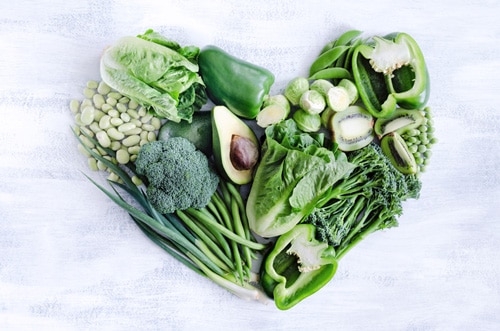This vitamin doesn’t get much attention. But a new study shows it may be the single most important nutrient for your heart. It prevents a serious and common condition that often leads to sudden cardiac arrest.1
Researchers from Augusta University in Georgia wanted to find out if this vitamin could stop left ventricular hypertrophy (LVH). It is a gradual enlargement and thickening of the walls of your heart’s left ventricle. That’s the main pumping chamber.
Over time, LVH causes the heart muscle to lose elasticity, work harder, and eventually fail to pump enough blood. This can trigger a heart attack.
About 40% of the population has LVH. It’s right up there with obesity, smoking, and family history as a risk factor for heart attack and heart failure.2 3
Vitamin K Prevents LVH
In the new study, researchers examined 766 young people. Using echocardiograms, they assessed the left ventricular structure and functioning of the participants. They also gathered data on their diet and physical activity.4
Even though the participants were young, 10% had some degree of LVH. And those who consumed the least vitamin K were more than three times as likely to have LVH.
The researchers concluded: “Greater vitamin K consumption may favorably influence subclinical markers of cardiac structure and function.”
The study recently was published in The Journal of Nutrition.
It’s Easy to Get More Vitamin K
Vitamin K isn’t only good for your heart. It encourages normal blood clotting. This makes it an essential nutrient for healing injuries. Vitamin K also reduces bone loss linked to aging.5
Vitamin K is also known as phylloquinone or vitamin K1. You don’t need much of it to keep your heart healthy.
In the study, participants getting 90 micrograms a day were unlikely to have LVH.6
Dietary sources of vitamin K include green leafy vegetables such as collards, leaf lettuce, kale, mustard greens, parsley, romaine lettuce, spinach, Swiss chard, and turnip greens. Vegetables such as broccoli, Brussels sprouts, cauliflower, and cabbage also contain vitamin K.7
Eating just a small amount of greens every day gives you enough vitamin K to ward off LVH. For example, just a quarter cup of cooked kale contains 265 mcg of K1.8
You can also get the vitamin K you need in a supplement. Look for one that includes both K1 and K2 forms. But make sure that you take it with a meal, preferably one with some healthy fats. Vitamin K is fat soluble. Taking it with olive oil, avocado, wild-caught fish, or organic beef will help your body absorb it.9
Editor’s Note: If you are worried about your heart, there’s another nutrient you should know about. It has been shown to lower cholesterol safer than a well-known prescription drug.
Discover all the details HERE.
Like this Article? Forward this article here or Share on Facebook.
References:
1 https://www.mayoclinic.org/diseases-conditions/left-ventricular-hypertrophy/basics/complications/con-20026690
2 https://www.ncbi.nlm.nih.gov/pubmed/22113443
3 https://www.hindawi.com/journals/ijhy/2011/495349/
4 http://jn.nutrition.org/content/147/10/1960.full
5 https://www.drweil.com/vitamins-supplements-herbs/vitamins/health-benefits-of-vitamin-k/
6 https://www.medicalnewstoday.com/articles/319645.php
7 https://www.livescience.com/51908-vitamin-k.html
8 http://healthyeating.sfgate.com/much-vitamin-k-half-cup-spinach-micrograms-4934.html
9

